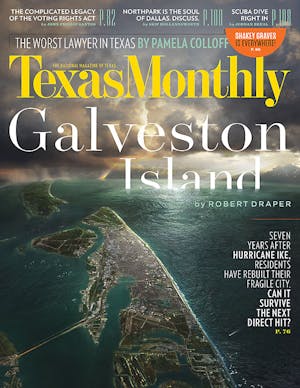The first column I wrote for Texas Monthly appeared in the March 2000 issue. The article was titled “Voting Rites,” and I argued that the Voting Rights Act, which Lyndon Johnson had proposed to a joint session of Congress 35 years earlier, was the greatest accomplishment of his presidency.
The truth is, I didn’t know very much about LBJ before I came to work at Texas Monthly. I am a native Texan who passed seventh-grade history with straight A’s, but I remembered him only for his role in the Vietnam War. I’m ashamed to say that when I was a freshman at the University of North Texas and saw Oliver Stone’s film JFK, which came out in 1991, I assumed that Johnson could have played a role in John Kennedy’s assassination.
That changed when I started reading the magazine’s terrific archive of stories about LBJ. I began to understand the Shakespearean complexity of the man, who could be cruel and kind, thoughtful and crude in the span of a single conversation. That led me to volumes by Robert Dallek, Robert Caro, and Michael Beschloss. Never have I laughed out loud so often while reading about a president; never have I been so awed by a politician’s sheer determination to achieve; never have I shaken my head in such dismay at so many missed opportunities. But when it came to civil rights, the critical domestic issue of his administration, Johnson purposefully set out to finish what Abraham Lincoln had started—and did precisely that.
This issue contains a trio of stories that examines the complicated legacy of the Voting Rights Act, which became law fifty years ago this month. In “The Agitator,” Katy Vine profiles Curtis Graves, who, in 1967, became the first African American to serve in the Texas House in the twentieth century but who often labored in the shadow of Barbara Jordan. John Phillip Santos explores his family’s roots in “Return to Cotulla,” revisiting the town where a young LBJ taught Mexican American students at the local public school. A photo essay called “While We’re Young,” shot by Joel Salcido and featuring interviews by Pamela Colloff, examines the attitudes of the newest generation of voters in the Rio Grande Valley.
Taken together, the package offers context for a problem that is far from settled: in 2013 key portions of the Voting Rights Act were set aside by the U.S. Supreme Court, and a redistricting case, with roots in the state Senate, that could diminish minority representation will be heard by the high court in its upcoming term. It may soon be the case that LBJ’s greatest legislative achievement could itself be history.
- More About:
- Texas History
- Politics & Policy
- LBJ








